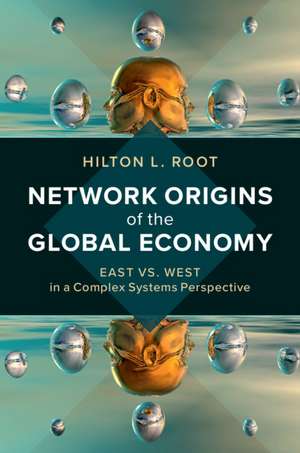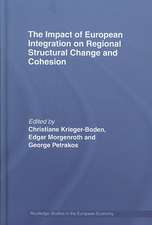Network Origins of the Global Economy: East vs. West in a Complex Systems Perspective
Autor Hilton L. Rooten Limba Engleză Hardback – 18 mar 2020
Preț: 341.87 lei
Nou
Puncte Express: 513
Preț estimativ în valută:
65.41€ • 68.31$ • 54.02£
65.41€ • 68.31$ • 54.02£
Carte disponibilă
Livrare economică 25 martie-08 aprilie
Preluare comenzi: 021 569.72.76
Specificații
ISBN-13: 9781108488990
ISBN-10: 1108488994
Pagini: 334
Ilustrații: 14 b/w illus. 2 tables
Dimensiuni: 160 x 235 x 23 mm
Greutate: 0.54 kg
Editura: Cambridge University Press
Colecția Cambridge University Press
Locul publicării:Cambridge, United Kingdom
ISBN-10: 1108488994
Pagini: 334
Ilustrații: 14 b/w illus. 2 tables
Dimensiuni: 160 x 235 x 23 mm
Greutate: 0.54 kg
Editura: Cambridge University Press
Colecția Cambridge University Press
Locul publicării:Cambridge, United Kingdom
Cuprins
Preface Brian Arthur; Part I. Political Economy and Complex Systems: 1. Great transitions in economic history; 2. Growth, form, and self-organization in the economy; 3. Human evolutionary behavior and political economy; Part II. An Analysis of Historical Regimes: 4. Network assemblage of regime stability and resilience; 5. Network formation and the emergence of law: from feudalism to small-world connectivity (with Cameron Harwick); 6. The network foundations of the Great Divergence (with Qing Tian); Part III. The Coming Instability: 7. Has the baton passed to China? (with Liu Baocheng); 8. China's ambitions and the future of the global economy (with Liu Baocheng); 9. Global networks over time (with Kevin Comer, Jack Goldstone, and David Masad); 10. A future of diminishing returns or massive transformation?; 11. Network structure and economic change: East vs. West.
Recenzii
'[The] subject is indeed of great importance.' Kenneth Arrow, Nobel Laureate
'Based on a unique methodological combination of institutional economic, complexity theory and network science, Hilton L. Root´s book provides invaluable new means and ideas to address the big questions of global history. It carries us from guestimates based on sparse data to formal approaches and nuanced comparisons.' Johannes Preiser-Kapeller, Institute for Medieval Research/Division for Byzantine Research, Austrian Academy of Sciences
'Root … helps unravel many puzzles that have intrigued social scientists, such as the motivation behind European overseas expansion.' Aris Trantidis, Journal Perspectives on Politics
'In our current state of emergency we are highly focused on nation state dynamics. However complexity economics looks at the dominance of systems and networks beyond these constructs. Hilton Root has written the interconnectedness of Europe and China through the lens of history. My conclusion: supply chains and other relationships won't be that easy to dislodge once this crisis is over. I highly recommend this book to our readers, especially those with an interest in economic history.' Lyric Hale, EconVue
'The term that best describes what this book does is 'institutional network theory'. Starting from the premises of new institutionalism and applying networks, Root builds a dynamic framework in which to conceive of time and history. Complexity is introduced in his conception of the aggregate system-level behaviour. The result significantly advances our understanding of how agency and structure confront each other.' Aris Trantidis, International Affairs
'This book provides unprecedented inspiration for scholars of Friedrich Hayek and Michael Polanyi because it takes formation-thinking to a whole new level. Complexity economics, as Root calls it, seems to offer a fascinating new approach to advance our thinking about spontaneous and corporate orders by taking the middle road between economic history (and economic anthropology) and network science. Hopefully, this original volume will not only serve as a useful textbook for university courses, but will also launch a torrent of related studies exploring the social worlds behind our constantly changing economic structures.' Gábor Bíró, LSE Review of Books
'Hilton Root's Network Origins of the Global Economy contributes unique new perspectives for understanding the political economy of institutional change … some of his key ideas could become the foundations of further hypothesis generation and theory building, which could in turn enrich ongoing academic debates.' Ammar Malik, Journal of Artificial Societies and Social Simulation
'Network Origins is rich with insights into the deep historical origins of the Great Divergence, insights that will repay future study … makes a vital contribution laying out the key concepts of a network-centered theory of institutional change and in outlining how it could be applied to the questions raised by the Great Divergence.' Mark Koyama, Public Choice
'Network Origins should alert policy makers to these blind spots, which are the cause of misunderstanding and a lack of trust between China and the West. By taking a long view and capturing the highly disparate historical trajectories of the East and West, this book offers a unified framework to comparatively understand China's internal logic of national development and expansion. It will be indispensable for rethinking global order regarding both China and emerging centers of power in a world where power is far more broadly distributed than during the Cold War.' Kanishka Balasuriya, Governance
'… a refreshing, alternative reading of some of the great transformations in European and Chinese economic history … the book presents a timely contribution.' Nana de Graaff, International Spectator
'... offers a new perspective on the study of historical political economy.' Clair Z. Yang, EH.Net
'Based on a unique methodological combination of institutional economic, complexity theory and network science, Hilton L. Root´s book provides invaluable new means and ideas to address the big questions of global history. It carries us from guestimates based on sparse data to formal approaches and nuanced comparisons.' Johannes Preiser-Kapeller, Institute for Medieval Research/Division for Byzantine Research, Austrian Academy of Sciences
'Root … helps unravel many puzzles that have intrigued social scientists, such as the motivation behind European overseas expansion.' Aris Trantidis, Journal Perspectives on Politics
'In our current state of emergency we are highly focused on nation state dynamics. However complexity economics looks at the dominance of systems and networks beyond these constructs. Hilton Root has written the interconnectedness of Europe and China through the lens of history. My conclusion: supply chains and other relationships won't be that easy to dislodge once this crisis is over. I highly recommend this book to our readers, especially those with an interest in economic history.' Lyric Hale, EconVue
'The term that best describes what this book does is 'institutional network theory'. Starting from the premises of new institutionalism and applying networks, Root builds a dynamic framework in which to conceive of time and history. Complexity is introduced in his conception of the aggregate system-level behaviour. The result significantly advances our understanding of how agency and structure confront each other.' Aris Trantidis, International Affairs
'This book provides unprecedented inspiration for scholars of Friedrich Hayek and Michael Polanyi because it takes formation-thinking to a whole new level. Complexity economics, as Root calls it, seems to offer a fascinating new approach to advance our thinking about spontaneous and corporate orders by taking the middle road between economic history (and economic anthropology) and network science. Hopefully, this original volume will not only serve as a useful textbook for university courses, but will also launch a torrent of related studies exploring the social worlds behind our constantly changing economic structures.' Gábor Bíró, LSE Review of Books
'Hilton Root's Network Origins of the Global Economy contributes unique new perspectives for understanding the political economy of institutional change … some of his key ideas could become the foundations of further hypothesis generation and theory building, which could in turn enrich ongoing academic debates.' Ammar Malik, Journal of Artificial Societies and Social Simulation
'Network Origins is rich with insights into the deep historical origins of the Great Divergence, insights that will repay future study … makes a vital contribution laying out the key concepts of a network-centered theory of institutional change and in outlining how it could be applied to the questions raised by the Great Divergence.' Mark Koyama, Public Choice
'Network Origins should alert policy makers to these blind spots, which are the cause of misunderstanding and a lack of trust between China and the West. By taking a long view and capturing the highly disparate historical trajectories of the East and West, this book offers a unified framework to comparatively understand China's internal logic of national development and expansion. It will be indispensable for rethinking global order regarding both China and emerging centers of power in a world where power is far more broadly distributed than during the Cold War.' Kanishka Balasuriya, Governance
'… a refreshing, alternative reading of some of the great transformations in European and Chinese economic history … the book presents a timely contribution.' Nana de Graaff, International Spectator
'... offers a new perspective on the study of historical political economy.' Clair Z. Yang, EH.Net
Notă biografică
Descriere
Root shows how the tools of network analysis can be used to understand great transitions in global economic history.

























